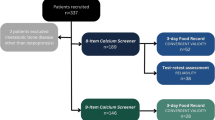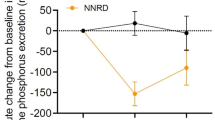Abstract
Background/Objectives:
Dietary approaches to preventing the recurrence of idiopathic calcium-containing kidney stones are effective. However, a lifelong commitment to prevention is challenging for many patients. Multiple patient factors likely account for compliance and adherence with dietary recommendations. We examined patients’ recall and compliance with dietary recommendations provided during clinical evaluation.
Subjects/Methods:
Of 275 patients who received dietary recommendations from a dietitian, 112 completed an investigator-designed survey querying their recollection of dietary recommendations. Patients’ responses were compared with the recommendations actually provided as entered in patients’ medical records.
Results:
Patients (62% male, 56±13 years; 38% female, 52±14 years) were provided 3.4±1.1 recommendations (min–max, 1–6) and recalled 67% of recommendations. Highest recalls were for (i) lower meat/fish/poultry intake, (ii) higher fluid intake and (iii) lower sodium (⩾68% for all). Lowest recalls were for weight loss, using citrus juices and increasing fruits/vegetables (⩽61% for all). Forty-seven percent of patients given 1–3 recommendations recalled 100%, whereas only 23% of patients provided >3 recommendations did so (P=0.011). Even though 38% of patients reported some difficulty following dietary recommendations, nearly all (91%) said that they were willing to continue following them.
Conclusions:
Higher patient recall is associated with ⩽3 dietary recommendations. Patient recall of recommendations that were not actually provided (‘false recall’) may contribute to reduced recall and confusion about the most important dietary strategies to reduce their stone risk. Accordingly, providers should prioritize the most important dietary recommendations, reserving those less important for follow-up, and address any confusion patients have from information received prior to evaluation.
This is a preview of subscription content, access via your institution
Access options
Subscribe to this journal
Receive 12 print issues and online access
$259.00 per year
only $21.58 per issue
Buy this article
- Purchase on Springer Link
- Instant access to full article PDF
Prices may be subject to local taxes which are calculated during checkout

Similar content being viewed by others
References
Friedlander JI, Antonelli JA, Pearle MS . Diet: from food to stone. World J Urol 2015; 33: 179–185.
Dell’Orto VG, Belotti EA, Goeggel-Simonetti B, Simonetti GD, Ramelli GP, Bianchetti MG et al. Metabolic disturbances and renal stone promotion on treatment with topiramate: a systematic review. Br J Clin Pharmacol 2014; 77: 958–964.
Pearle MS, Goldfarb DS, Assimos DG, Curhan G, Denu-Ciocca CJ, Matlaga BR et al. Medical management of kidney stones: AUA guideline. J Urol 2014; 192: 316–324.
Penniston KL, Nakada SY . Diet and alternative therapies in the management of stone disease. Urol Clin North Am 2013; 40: 31–46.
Escribano J, Balaguer A, Roqué i Figuls M, Feliu A, Ferre N . Dietary interventions for preventing complications in idiopathic hypercalciuria. Cochrane Database Syst Rev 2014; 2: CD006022.
Fink HA, Wilt TJ, Eidman KE, Garimella PS, MacDonald R, Rutks IR et al. Medical management to prevent recurrent nephrolithiasis in adults: a systematic review for an American College of Physicians Clinical Guideline. Ann Intern Med 2013; 158: 535–543.
Heilberg IP, Goldfarb DS . Optimum nutrition for kidney stone disease. Adv Chronic Kidney Dis 2013; 20: 165–174.
Nielsen DE, El-Sohemy A . A randomized trial of genetic information for personalized nutrition. Genes Nutr 2012; 7: 559–566.
Franz MJ, Boucher JL, Evert AB . Evidence-based diabetes nutrition therapy recommendations are effective: the key is individualization. Diabetes Metab Syndr Obes 2014; 7: 65–72.
Hans-Martin F, Dötzer K . Improving the compliance of the recurrent stone former. Arab J Urol 2012; 10: 342–346.
Attalla K, De S, Monga M . Oxalate content of food: a tangled web. Urology 2014; 84: 555–560.
Penniston KL . The nutrition consult for recurrent stone formers. Curr Urol Rep 2015; 16: 47.
Page P, Verstraete DG, Robb JR, Etzwiler DD . Patient recall of self-care recommendations in diabetes. Diabetes Care 1981; 4: 96–98.
Rost K, Roster D, Bertakis K, Quill T . Physician-patient familiarity and patient recall of medication changes: the collaborative study group of the SGIM task force on the doctor and patient. Fam Med 1990; 22: 453–457.
Taylor EN, Stampfer MJ, Curhan GC . Obesity, weight gain, and the risk of kidney stones. JAMA 2005; 293: 455–462.
Noori N, Honarkar E, Goldfarb DS, Kalantar-Zadeh K, Taheri M, Shakhssalim N et al. Urinary lithogenic risk profile in recurrent stone formers with hyperoxaluria: a randomized controlled trial comparing DASH (dietary approaches to stop hypertension)-style and low-oxalate diets. Am J Kidney Dis 2014; 63: 456–463.
Jin J, Sklar GE, Min Sen Oh V, Chuen Li S . Factors affecting therapeutic compliance: a review from the patient’s perspective. Ther Clin Risk Manag 2008; 4: 269–286.
Fadnes L, Taube A, Tylleskar T . How to identify information bias due to self-reporting in epidemiological research. The Internet Journal of Epidemiology 2009; 7: 2.
Hebert JR, Ma Y, Clemow L, Ockene IS, Saperia G, Stanek DJ 3rd et al. Gender differences in social desirability and social approval bias in dietary self-report. Am J Epidemiol 1997; 146: 1046–1055.
Pearle MS, Goldfarb DS, Assimos DG, Curhan G, Denu-Ciocca CJ, Matlaga BR et al. Medical management of kidney stones: AUA guideline. J Urol 2014; 192: 316–324.
Institute of Medicine; Food and Nutrition Board Dietary Reference Intakes: The Essential Guide to Nutrient Requirements. National Academies Press: Washington DC, USA, 2006.
Tang M, Larson-Meyer DE, Liebman M . Effect of cinnamon and turmeric on urinary oxalate excretion, plasma lipids, and plasma glucose in healthy subjects. Am J Clin Nutr 2008; 87: 1262–1267.
Terris MK, Issa MM, Tacker JR . Dietary supplementation with cranberry concentrate tablets may increase the risk of nephrolithiasis. Urology 2001; 57: 26–29.
Author information
Authors and Affiliations
Corresponding author
Ethics declarations
Competing interests
The authors declare no conflict of interest.
Additional information
Author contributions
KLP formulated the clinical research question, designed the protocol, analyzed data and wrote the manuscript. KLP provided medical nutrition therapy to patients as part of her responsibilities as registered dietitian nutritionist in the Metabolic Stone Clinic. MLW developed the survey and carried out correspondence with patients. She assisted with data analysis and the writing of the manuscript. SYN assisted with the formulation of the clinical research question, project design, and data interpretation and analysis. RAJ assisted with the formulation of the clinical research question and assisted with data interpretation and analysis. RAJ provided clinical care to patients as part of his responsibilities as nephrologist and director of the Metabolic Stone Clinic.
Rights and permissions
About this article
Cite this article
Penniston, K., Wertheim, M., Nakada, S. et al. Factors associated with patient recall of individualized dietary recommendations for kidney stone prevention. Eur J Clin Nutr 70, 1062–1067 (2016). https://doi.org/10.1038/ejcn.2016.79
Received:
Accepted:
Published:
Issue Date:
DOI: https://doi.org/10.1038/ejcn.2016.79
This article is cited by
-
Patient compliance to dietary recommendations: tips and tricks to improve compliance rates
World Journal of Urology (2023)
-
Urinary supersaturation in a Randomized trial among Individuals with Nephrolithiasis comparing Empiric versus selective therapy (URINE): design and rationale of a clinical trial
Urolithiasis (2023)
-
New treatment paradigms for ADPKD: moving towards precision medicine
Nature Reviews Nephrology (2017)



